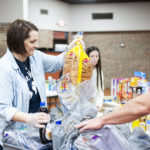CORPUS CHRISTI—Ministry deeply shapes the lives of Steve and Cindy Jaquez, who have been together since they became a part of Segunda Iglesia Bautista of Corpus Christi in the 1970s.

The couple pursued ministry, and God called them to serve churches in Dallas and the Rio Grande Valley. But five years ago, God called them back home to Segunda Iglesia Bautista, when the church needed to heal and focus on the mission God had given the congregation.
Since Steve Jaquez arrived as pastor, the church has grown, and the congregation began looking for ways to reach others.
Cindy Jaquez noticed potential for church’s digital outreach to grow. Although Segunda had a website, the church barely used it.
As the couple considered how they could reach others through online communication, they found more than just answers at Stark College and Seminary.
The vice president of student experience at Stark, Tina Cooper, offered for the first time a class on Technology in Ministry
Thankfully, Steve and Cindy Jaquez each had learned to follow when God calls one of them. More than 40 years ago, he first helped her connect with Segunda Iglesia Bautista, and she became a Christian.
Now that they are back at Segunda, she noticed the outreach they could do through the Internet. And while he decided first to continue his education at Stark, she was the one who chose to take the Technology in Ministry class.
Moving quickly from theory to application
Cooper intended the class to help students analyze how technology affects churches, but COVID-19 change those plans and also helped create an opportunity.
“We know everyone involved at Stark College just experienced a major life event because of COVID-19,” Cooper said. “But the purpose of this class was to help students outside of their comfort areas.”
About 80 percent of the student population at Stark fit the nontraditional category, which means they are age 25 or older, Cooper said. Nearly half—47 percent—of the students are 40 years old or older.
So, while those students may hold important leadership roles at their churches, they also may not be familiar with using technology in an increasingly digital world, Cooper added.
Cooper imagined the class discussing and analyzing theories on how technology could help churches. Then, by the middle of March when the COVID-19 lockdown began, the school began preparing its faculty and staff so classes could continue online after spring break.
“We ended up getting thrown into doing technology at church because of COVID-19,” Cooper said. “We moved from a class on theory to problem-based learning.”
At first, each student worked individually on a project. But students soon realized they could all work together and target different areas individually. They chose to focus on helping Segunda Iglesia Bautista.
“We knew technology could help and hinder churches and their mission,” Cooper said.
Class helps develop strategy for streaming worship
As churches limit their person-to-person interaction, providing video of the church services can help individuals stay connected and even broaden the church’s message, she noted.
But due to its limited budget, Segunda Iglesia Bautista thought it lacked the equipment or the staff necessary to webcast its services.
“There are many aspects of technology that can become overwhelming for churches,” Cooper said. “But we also wanted to show there are ways their churches can take advantage of technology for the sake of their church and the gospel.”
Students learned the basics of different concepts of technology, including software, hardware and digital services. As students experimented with new technologies, they shared their experiences with each other, Cooper noted.
Working with Segunda Iglesia Bautista in Corpus Christi allowed students to learn how to work with budgets and administration, as they aimed to provide a service that would be sustainable for the congregation, Cooper added.
For instance, one of Cooper’s students considered the cost of webcasting worship services by looking at cameras, cables, a streaming system and audio, along with software and hardware updates. He estimated the cost at about $20,000 per year—far beyond the budget of a congregation like Segunda.
So, students focused on “finding solutions with room for growth and the understanding on how to grow,” Cooper said.
Considering Segunda Iglesia Bautista’s budget, students developed a plan for the church to begin streaming its worship services using a smartphone camera. Next, students projected a three-year plan for the church to find the funds to buy more technology and hire someone to operate the equipment on Sundays.
On March 29, Segunda Iglesia streamed its first worship service on Facebook, Cindy Jaquez said.
“From that, we moved to other online services like YouTube,” she added. “While my intentions were to just get our church a website, we were able to get a lot more than that.”
Segunda Iglesia now reaches people not only in its community, but also throughout the United States and in Latin America, Steve Jaquez said. The church is continuing to expand its online presence, thanks to the help Stark College provided.
“Hopefully, our experience can help others figure this out and reach more people with the message God has for them,” he said.















We seek to connect God’s story and God’s people around the world. To learn more about God’s story, click here.
Send comments and feedback to Eric Black, our editor. For comments to be published, please specify “letter to the editor.” Maximum length for publication is 300 words.